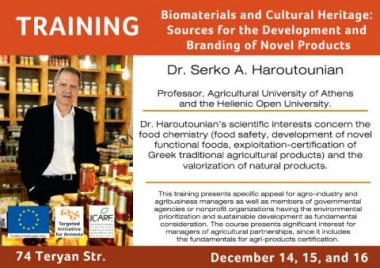Armenia Model European Union 2016 is a youth project aiming to increase the knowledge of participants about the interrelations of national and Euro
Biomaterials and Cultural Heritage: Sources for the Development and Branding of Novel Products

Bio-economy has recently been emerged as one of the key tools for Sustainable Development, forcing the European Union to adopt a relevant strategic approach and allocate significant funds within the framework of Horizon 2020. One of prime pillars of bio-economy which refers to the exploitation/valorization of biomaterials presently considered as wastes, constitutes the spine of this course. In particular, specific examples of three different approaches, complementary to each other, will provide the audience with the required knowledge and insight for the identification of valuable resources, the implementation of their valorization and exploitation procedures and finally the registration of the final products under the framework of the European Agricultural Products Quality Policy.
Though the course is developed in a generalized concept, it presents specific appeal for agro-industry and agribusiness managers as well as to members of governmental agencies or nonprofit organizations having as fundamental consideration the environmental prioritization and sustainable development. Finally, the course presents significant interest for managers of agricultural partnerships, since includes the fundamentals for agri-products cert
Agenda
Date: December 14
Time: 18:30-20:30 - Valorisation of agro-industrial wastes for the production and marketing of cosmetics, food supplements and pharmaceuticals
A valorization streamline approach leading to high added value end products, with special focus on winery wastes and the acquisition of polyphenol rich extracts and products, will be presented. The course will elaborate on a success story that concluded to the production of a cosmetic brand from winery wastes, but will also investigate the intriguing potentials for the development of food additives, nutraceuticals and pharmaceuticals through the same value chain. An overview of the theory, the wastes batch-process, their marketing and some practical applications will be presented.
Date: December 15
Time: 18:30-20:30 Exploitation of biodiversity for the production of novel products of natural origin
The consideration of biodiversity only as a subject of protection constitutes a serious drawback, acting as a threshold for the development of protected areas and the valorization of wild plant species. Despite these problems and misconceptions, biodiversity is a valuable natural resource, renowned for its pharmaceutical and biotechnological applications. This course aspires to provide a more fundamental approach for the valorization of the biodiversity through the presentation-discussion of several key steps and actions for the sustainable exploitation of wild plant populations. The case of Sideritis clandestina, also known as Greek Mountain Tea, will be presented and analyzed. At the end of the course a methodological replication scheme will be provided to the trainees.
Date: December 16
Time: 18:30-20:30 - European schemes for quality assurance and certification of foods and agricultural products
Quality is a key issue for every farmer and consumer, regardless if concerns commodities produced by basic procedures and standards or high-end quality products. Countries of limited Agricultural resources -like Armenia- has to invest and rely on high quality reputation in order to sustain competitiveness and profitability. EU quality schemes identify products and foodstuffs farmed and produced to exacting specifications. Three EU schemes known as PDO (Protected Designation of Origin), PGI (Protected Geographical Indication) and TSG (Traditional Specialty Guaranteed), along with the newly introduced quality scheme for Mountainous Farming Products aim to promote and protect names of quality of agricultural products and foodstuffs. The prerequisites and the step-by-step registration procedures will be presented in detail for all of the above mentioned schemes, utilizing as case studies the recently certified PDO Greek Products “Fava Santorinis”, “Tomataki Santorinis” and “Tsipouro Tyrnavou”.
ification.






